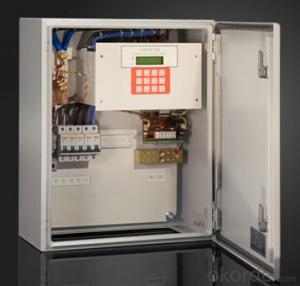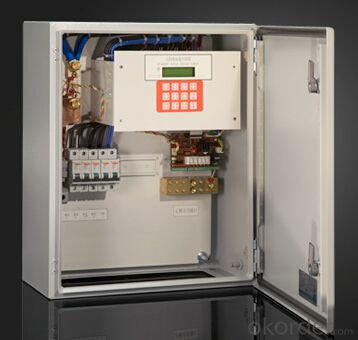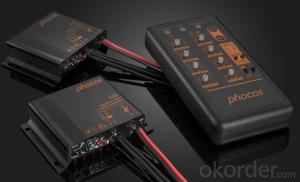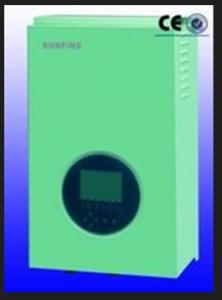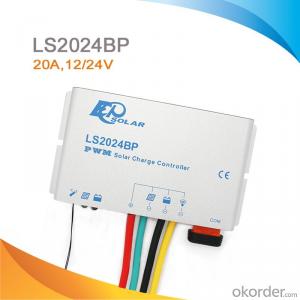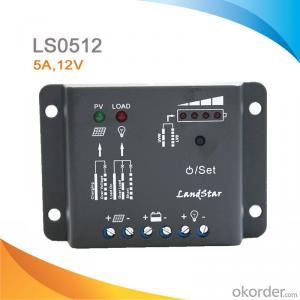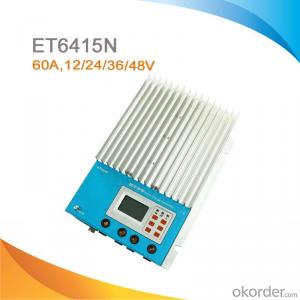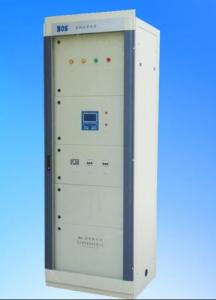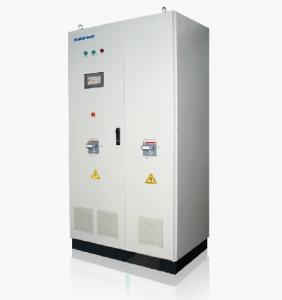Goldline Solar Controllers SPS Series (100 – 300 A) High-End Solar Regulation System
- Loading Port:
- China Main Port
- Payment Terms:
- TT OR LC
- Min Order Qty:
- -
- Supply Capability:
- 10000 unit/month
OKorder Service Pledge
OKorder Financial Service
You Might Also Like
· 12, 24 and 48 V versions available
· R5232/485 data interface
· Fully programmable
· Designed for Telecom applications
· Ultra low noise emissions due to bank switching design
· Almost any accessory feature possible
·
· The SPS series Solar Regulation System is an advanced electronic control unit for solar power supplies in remote locations. It will prevent overcharging, reduce electrolyte loss and stop over discharge. This will extend battery life and reduce maintenance.
· State of the art technology has been combined with simple modular construction to create a system with better performance and more features than any other controller in its class. All control levels are fully adjustable and can be changed by remote control. They are flexible in use, easy to service and are powering telecommunications in some of the most remote parts of the world.
- Q: How often should a solar controller be replaced?
- The solar controller, also known as the charge controller, plays a crucial role in regulating the voltage and current between the solar panels and batteries in a solar power system. Its lifespan can vary depending on factors like quality, usage, and environmental conditions. Typically, a well-maintained and high-quality solar controller can last anywhere from 10 to 15 years or even longer. However, it is essential to regularly monitor its performance to ensure optimal functioning. Several factors need consideration when determining whether to replace a solar controller: 1. Age: If your solar controller is approaching or has exceeded the typical lifespan of 10-15 years, it may be wise to consider replacement. 2. Performance: If you observe a significant decline in the efficiency or effectiveness of your solar power system, it might indicate that the solar controller is not performing as it should. Issues like erratic charging, overcharging, or voltage regulation failure would warrant a replacement. 3. Technological advancements: Solar controller technology continually advances and improves. If significant advancements have occurred since your current controller was installed, upgrading to a newer model could provide better efficiency, enhanced features, and improved performance. 4. Maintenance and environmental factors: Regular maintenance and proper care can prolong the lifespan of a solar controller. However, if the controller has been exposed to harsh environmental conditions like extreme temperatures, high humidity, or excessive moisture, it may degrade faster and require earlier replacement. Before deciding to replace your solar controller, it is crucial to consult a professional solar installer or technician. They can assess your specific solar power system circumstances and offer expert advice on whether a replacement is necessary.
- Q: What is the input voltage range of a solar controller?
- The input voltage range of a solar controller typically depends on the specific model and design, but it is commonly between 12V and 48V.
- Q: Can a solar controller be used in off-grid systems?
- Yes, a solar controller can be used in off-grid systems. In fact, it is a crucial component in off-grid solar systems as it regulates the charging and discharging of batteries, ensuring that they are properly charged and protected from overcharging or excessive discharge. The solar controller also helps optimize the efficiency and performance of the solar panels, thus maximizing the energy output in off-grid applications.
- Q: Can a solar controller be used in conjunction with a solar inverter?
- Yes, a solar controller can be used in conjunction with a solar inverter. A solar controller helps regulate and optimize the charging of the batteries connected to the solar system, while a solar inverter converts the DC power generated by the solar panels into AC power for use in homes or businesses. By working together, the solar controller and inverter ensure efficient and reliable operation of a solar power system.
- Q: Can a solar controller be used with a 12V battery system?
- Yes, a solar controller can be used with a 12V battery system.
- Q: Can a solar controller be used with solar panels of different wattage?
- Yes, a solar controller can be used with solar panels of different wattage. The main function of a solar controller is to regulate and optimize the charging of batteries from solar panels. It does not rely on the wattage of the panels but rather on the voltage and current they generate. As long as the voltage and current output of the solar panels falls within the acceptable range supported by the solar controller, it can be used with panels of different wattage.
- Q: What is the maximum power rating of a solar controller?
- The maximum power rating of a solar controller depends on the specific model, but it typically ranges from 10 to 60 amps.
- Q: Can a solar controller be used in a solar-powered electric scooter charging system?
- Yes, a solar controller can be used in a solar-powered electric scooter charging system. The solar controller plays a crucial role in regulating the flow of electricity from the solar panels to the battery of the electric scooter. It ensures that the charging process is safe and efficient by monitoring and controlling the voltage and current.
- Q: How does a solar controller handle battery capacity testing and calibration?
- The management of battery charging and discharging in a solar power system is overseen by a solar controller. To conduct battery capacity testing and calibration, the solar controller utilizes several important techniques. First and foremost, battery capacity testing is performed by the solar controller. This involves discharging the battery in controlled conditions to ascertain its real capacity. The controller may periodically conduct this test to evaluate the battery's well-being and ensure accurate monitoring of its capacity. Throughout the test, the solar controller accurately calculates the battery's capacity by monitoring its voltage, current, and temperature. Moreover, the solar controller often incorporates features for battery capacity calibration. This allows the controller to adjust its charging and discharging algorithms based on the battery's actual capacity. By calibrating the system to match the battery's true capacity, the solar controller can optimize the charging process, prevent overcharging or undercharging, and prolong the battery's lifespan. Calibration may involve modifying charge and discharge thresholds, compensating for temperature fluctuations, and fine-tuning charging parameters to align with the battery's unique characteristics. To effectively handle battery capacity testing and calibration, a solar controller typically requires precise voltage and current sensors, as well as temperature sensors to monitor the battery's conditions. These sensors assist the controller in collecting the necessary data for testing and calibration, ensuring accurate and reliable measurements. It is important to note that the specific methods and features for battery capacity testing and calibration may vary among different solar controller models and manufacturers. In conclusion, a solar controller manages battery capacity testing and calibration by utilizing battery capacity testing procedures to evaluate the battery's health and accurately determine its capacity. The controller also integrates calibration features to adjust charging and discharging algorithms based on the battery's actual capacity, optimizing the system's performance and extending the battery's lifespan.
- Q: What are the key features to consider when choosing a solar controller?
- When choosing a solar controller, it is important to consider several key features. One of the most crucial features is the controller's maximum input voltage and current rating, as it should be compatible with the solar panel system you are using. Additionally, the controller's maximum load capacity should be considered to ensure it can handle the power demands of your appliances or batteries. The controller should also have a suitable charging algorithm, such as Pulse Width Modulation (PWM) or Maximum Power Point Tracking (MPPT), to efficiently charge the batteries. Other important features to consider include temperature compensation, communication capabilities, display options, and protection measures like overcharge, overload, and short circuit protection. Ultimately, the key features will depend on your specific solar system requirements and intended usage.
Send your message to us
Goldline Solar Controllers SPS Series (100 – 300 A) High-End Solar Regulation System
- Loading Port:
- China Main Port
- Payment Terms:
- TT OR LC
- Min Order Qty:
- -
- Supply Capability:
- 10000 unit/month
OKorder Service Pledge
OKorder Financial Service
Similar products
Hot products
Hot Searches
Related keywords
